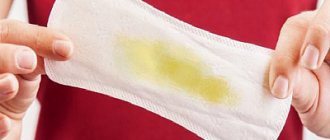back to all articles
Every self-respecting woman is sensitive to her health and body. However, at very different ages she may encounter such a phenomenon as odor in the intimate area. We are not talking about the natural, specific smell of a healthy woman’s vagina. This smell is considered normal, although it tends to change and become more noticeable, for example, on different days of the cycle or during sexual arousal.
However, a strong and clearly unpleasant odor without discharge is a cause for concern. This problem is not considered a disease, but may be a sign of a microflora disorder, which is fraught with consequences. The odor is often accompanied by vaginal discharge, itching and burning, redness of the genital mucosa and soreness. Discharge with an odor is an even more serious cause for concern, since this nuisance may be a manifestation of infection, development or chronicity of the inflammatory process. Such symptoms bring physical and psychological stress to a woman.
Physiological causes of vaginal odor:
- insufficient hygiene (including non-compliance with the rules for replacing feminine sanitary pads and tampons);
- allergic reaction to certain hygiene products;
- promiscuity;
- beginning of sexual life;
- low immunity;
- stress;
- excess weight;
- metabolic disease;
- pregnancy and childbirth;
- menstrual cycle (an unpleasant odor may occur in the second phase of the cycle or after menstruation);
- chronic emotional and physical fatigue;
- menopause;
- hormonal imbalance;
- endocrine disorders (in particular diabetes);
- wearing synthetic underwear and very tight clothing, which reduce air flow to the genitals;
- taking antibiotics.
How to get rid of odor using traditional methods?
Folk remedies are indicated primarily for those who have not yet undergone a gynecological examination and do not know the true cause of the foul odor. They can be a temporary measure to eliminate an unpleasant symptom or used as complex therapy (along with medication).
Douching with folk remedies
Types of douches
For vaginal douching, medicinal herbs are usually used. Here are some of the famous recipes:
- Chamomile decoction - 2-3 tbsp. l. dry raw materials, pour a liter of boiling water and bring to a boil over low heat, then cool until warm and strain. The prepared decoction should be used 3-4 times a day. Course of treatment: 7 days.
- Infusion of calendula flowers - 1-2 tbsp. l. dry herbs, pour a glass of boiling water, let it brew for an hour and strain through cheesecloth. Douching is recommended 3 times a week. Course of treatment: 10-12 procedures.
Pathological causes of vaginal odor:
- Vaginal dysbiosis: an imbalance of beneficial and pathogenic bacteria in the vagina, creating conditions for the proliferation of bacteria and fungi. As a result, the risk of developing inflammatory processes in the female genital area increases;
- thrush (vaginal candidiasis): a fungal infection, including that caused by the proliferation of a fungus of the genus Candida albicans;
- inflammatory processes (including chronic ones) occurring in the appendages and uterus;
- gardnerellosis (bacterial vaginosis): a violation of the normal microflora of the vagina associated with the development of the gardnerella bacterium, which can cause severe complications of women's health;
- colpitis (vaginitis): an inflammatory process that can be caused by injuries, endocrine and metabolic disorders, sexually transmitted diseases, and the development of coccal flora.
Additional symptoms
When vaginal discharge smells like fish, this is an alarming sign of the development of genital tract pathology. In the acute phase of the disease, in addition to the fishy smell, women are worried about:
- excess vaginal secretion of various colors;
- burning and itching in the perineal area;
- menstrual irregularities;
- redness or swelling of the external genitalia;
- constant feeling of humidity;
- irritation of the mucous membranes of the vagina;
- painful sensations during sex.
The appearance of a fishy smell is a consequence of the inflammatory process. Inflammation progresses as a result of the proliferation of pathogenic bacteria. The strong aroma of fish may be accompanied by discharge of varying consistency and color.
At the initial stage of dysbiosis, the discharge is whitish in color and has a uniform consistency. As the disease progresses, the leucorrhoea becomes green, gray or brown. The consistency becomes uneven. Mucus coats the walls of the vagina and accumulates in the genital tract. This is clearly visible when viewed on the chair.
What smells?
You should not ignore the question of what and why women smell in their intimate area. The fact is that the specificity of the unpleasant odor is directly dependent on the dominance of a certain type of fungal infection or type of microbe in the vagina. This can be a very unpleasant smell of rotten meat, rotten eggs, rot, etc. It happens that the problem overtakes a woman in the early stages of pregnancy.
- A fishy smell (including salted fish or herring) most often indicates gardnerellosis (bacterial vaginosis), vaginal dysbiosis and may be accompanied by significant vaginal discomfort. The unpleasant smell of rotten fish after childbirth may be a symptom of inflammation or infection.
- A sour smell and cheesy discharge occur with thrush and are accompanied by itching, burning, and redness of the genitals.
- If you smell of onions, this may indicate immunodeficiency, use of antibiotics, metabolic disorders, as well as the proliferation of fungal flora and tends to intensify during stress, the menstrual cycle, menopause, and pregnancy. May be accompanied by white, greenish or yellowish discharge.
- The purulent odor that accompanies itching, burning and soreness in the female genital area indicates that an infectious-inflammatory process may be occurring in the body.
- White discharge with a vinegar smell indicates poor hygiene.
- White discharge that smells like garlic indicates candidiasis (thrush), colpitis, bacterial vaginosis, sexually transmitted diseases. This smell can be caused by other reasons: the beginning of sexual life, a change of partner, taking hormonal medications, pregnancy, stress, changes in diet.
- A sour smell and white or yellow discharge (during pregnancy - burning and irritation in the intimate area) indicate thrush.
- The smell of kefir and sour milk and abundant thick discharge in the form of flakes are a sign of thrush.
How is bacterial vaginosis diagnosed?
There are no options to identify the disease with complete confidence on your own, without medical advice. Therefore, at the slightest suspicion, you should go to a gynecologist.
In clinical settings, vaginosis is diagnosed in the following way:
- First, a microscopy of a smear of a woman’s vaginal secretion is performed;
- in the laboratory, a culture of the vaginal microflora is done and the degree of development of dysbacteriosis is examined;
- bacteria that cause the disease (gardnerella) are identified;
- a test is required to determine the sensitivity of these bacteria to bacteriophages and antibiotics, and based on the results, an effective drug for treatment is selected;
- an analysis is carried out to identify the genetic material of the pathogenic bacterium in a chain reaction.
[media=
https://youtu.be/PDVoRbmSchg
]
The listed list of tests is not complete; the exact course of diagnosis is determined by the doctor.
Pharmacological treatment
A strong smell from the intimate area can significantly affect a woman’s quality of life, negatively affect her health, self-confidence, planning pregnancy and bearing a child, and complicate intimate relationships. A consultation with a gynecologist, laboratory tests and prescribed treatment helps to find out the causes of this condition and learn how to get rid of the smell and how to deal with this problem in general. Therefore, the smell is a reason to consult a doctor. In each specific case, effective drugs of systemic action or local treatment are prescribed: antibiotics, antifungal drugs, creams, aerosols, gels, suppositories (capsules), ointments. In addition to prescription drugs, there are medications that are sold in pharmacies without a doctor's prescription. One of these products is Lomexin cream (fenticonazole) - a modern drug that has complex antifungal and antibacterial effects. For thrush and genital tract infections, the cream is administered intravaginally (into the vagina) using an applicator. The course of treatment lasts 7 days.
Risk factors for developing bacterial vaginosis
It is difficult to predict the occurrence of pathology, since there are many reasons for its development. It is provoked by the following factors:
- hormonal imbalances, in particular after abortion;
- endocrine changes such as puberty, pregnancy or menopause;
- long course of antibiotic treatment, especially without medical supervision;
- intestinal dysbiosis, other gastrointestinal problems;
- the emergence of a new sexual partner with a very different macroflora.
Prevention of odor in the intimate area
Preventive measures play a big role in the life of every woman, because a disease is easier to prevent than to treat. To prevent the appearance of an unpleasant odor in the intimate area and the accompanying symptoms, you should:
- introduce fermented milk products into the diet;
- strictly observe the rules of personal and intimate hygiene: take a shower regularly, use products for the intimate area with a pH level of 4-5 (corresponding to a woman’s natural pH level), change sanitary pads every 2-3 hours, etc.;
- visit a gynecologist every year, during menopause - every six months;
- regularly take vitamin complexes, probiotics and prebiotics;
- do not overcool;
- take care of intimate safety and exclude indiscriminate sexual contacts.
Prevention
You can avoid the appearance of an alarming symptom by following these recommendations:
- immune support (vitamin complexes, hardening);
- use of barrier contraception;
- unprotected sexual contacts only with a regular partner;
- monitoring hormonal status, regular visits to an endocrinologist;
- preventive examinations by a gynecologist once a year;
- wearing underwear only made from natural fabrics;
- moderate use of intimate hygiene products;
- a reasonable approach to douching;
- a balanced diet (will help get rid of excess weight, normalize metabolism, strengthen the immune system);
- observing the rules of intimate hygiene, especially during menstruation.
Bacterial vaginosis brings discomfort to a woman’s sex life. Pathology increases the risk of contracting sexually transmitted infections, since the protective environment is weakened.
A gynecologist at the Diana clinic will help determine the cause of the unpleasant odor. The doctor will conduct an examination and prescribe laboratory tests that will help determine the cause of the pathology.
ONLINE REGISTRATION at the DIANA clinic
You can sign up by calling the toll-free phone number 8-800-707-15-60 or filling out the contact form. In this case, we will contact you ourselves.
If you find an error, please select a piece of text and press Ctrl+Enter
What discharge is considered normal?
All women normally have a small amount of vaginal discharge. They do not cause any discomfort, do not smell and are not accompanied by itching or other unpleasant symptoms. They have a white or slightly yellowish tint and a uniform consistency.
The substance appears as a result of the work of glands on the cervix and vagina. It provides protection to the genital tract from drying out and the penetration of pathogenic organisms. The constant secretion of mucus cleanses the fallopian tubes and vaginal cavity. She doesn't smell much, which is considered normal for all women. The intensity of the odor changes slightly throughout the menstrual cycle. If a woman begins to smell fishy, a diagnosis of the body is required.
On certain days of the cycle, the volume of discharge increases. There is more fluid a few days before ovulation, and on the day the egg is released, a discharge similar to egg white appears. They do not smell and do not cause discomfort. In the second half of the cycle, they acquire a yellowish tint - this indicates a sufficient amount of progesterone in the blood.
Normal and pathological odor of semen
Male sperm has a special smell due to the influence of sex hormones and pheromones. It smells quite sharp, which is normal. By changing its smell, you can judge the occurrence of changes in your health.
Normal limits
Normally, sperm smells like bleach, which may be similar to the aroma of mushrooms and chestnuts. The ejaculate of a healthy man is white and has a viscous consistency. It liquefies within a few minutes of release. The absence of odor or its low intensity cannot be a sign of disease.
What does smell depend on?
The way sperm smells is determined by the individual characteristics of the body, the foods eaten and the presence of bad habits. Its smell can change under stress, fatigue, after illness, and depends on the age of the man. The older the man, the stronger the ejaculate smells of bleach. Reduces the intensity of the odor by eating healthy foods, plenty of vegetables and fruits, juices, and maintaining a drinking regime.
Smell after eating fish
Some products can change the odor of a woman's sweat, body, and vaginal secretions. These include onions, garlic, and smoked meats. The change in odor is minor and rarely noticeable to others; it goes away within 1-2 days.
The reason that a woman’s discharge and sweat smells like fish after eating it is the low functionality of the liver and kidneys. This is especially likely if there is an odor after eating boiled, baked or fried fish. In these cases, it is recommended to check the operation of these bodies.
One of the most informative signs that is caused by a failure of kidney function is that a woman’s urine smells like rotten fish after eating fish.
Diagnostic methods
To identify the reason why a woman smells unpleasantly of fish and sweat, it is necessary to conduct a comprehensive examination. The gynecologist prescribes the following:
- Examination on a gynecological chair.
- Ultrasound of the pelvis.
- Smear to determine microflora.
- A smear to check for infections.
- PCR – for more accurate detection of pathogenic microorganisms.
- Analysis of sex hormone levels.
For most women, these types of diagnostics are sufficient to make a diagnosis. If it is difficult to determine the type of disease, an MRI of the pelvis, blood tests for tumor markers, laparoscopy of the uterus and appendages with a biopsy of the affected areas may be required.
Deviations from the norm during menstruation, pregnancy and menopause
The discharge may smell like rotten fish during menstruation, pregnancy, and menopause. This is due to the physiological uniqueness of the body or the occurrence of various pathological conditions. Therefore, it is imperative to come to the clinic when the “darling” appears. Only he can determine the pathogenesis of the occurrence of “aroma” and prescribe therapeutic measures.
Odor during pregnancy
During gestation, a woman experiences changes in the quantitative volume of hormones and a decrease in protective immune forces. At the same time, in the fair sex, who are expecting the birth of a baby, certain phenomena are observed in the body. An unusual discharge with an unpleasant rotten fish odor may occur.
Factors during pregnancy that can provoke changes in the nature of discharge while waiting for the birth of the child:
- hypothermia, overheating;
- the presence of concomitant pathologies;
- lack of useful vitamins and minerals;
- poor nutrition;
- violation of personal hygiene rules;
- presence of bad habits;
- nervous tension and so on.
The “aroma” of the discharge becomes pronounced. As a result of the deterioration of the body's defenses, the pathogens present in it are activated. As a result, chronic diseases worsen. At this time, a woman is more susceptible to infection by various parasites.
In some cases, the discharge after the baby is born has the smell of fish or spoiled meat
Odor and discharge during menopause and the postpartum period
Menopause is a normal process in a mature woman, which is caused by the withering of organs and systems. This phenomenon affects reproductive function. Slow withering occurs, and after that the process stops (the woman loses the ability to give birth to children).
When aging, vaginal discharge should have the usual structure, color and “aroma”. No changes should occur. Discharge in women with an unpleasant odor means the occurrence of inflammatory processes. Therefore, you should contact a medical institution for diagnostic measures.
In the postpartum period, girls experience discharge that resembles menstruation. However, they should not have a specific odor. Gradually, the discharge begins to lighten until it becomes almost colorless.
In some cases, the discharge after the baby is born has the smell of fish or spoiled meat. This is not a normal condition. This phenomenon may mean that the woman has developed inflammation in the tissues of the uterus as a result of infectious bacteria entering it during the birth of the baby. This pathological condition requires immediate medical attention.
After menstruation
Menstruation is a normal process for a healthy girl. A smell after menstruation may indicate the development of inflammatory pathologies. The main factors causing the occurrence are the following:
- during the menstrual cycle, the protective functions of the vaginal mucosa deteriorate;
- during menstruation, an ideal environment is formed for the synthesis of pathogenic microorganisms;
- imbalance of vaginal microflora as a result of lack of hygiene, rare changes of pads or tampons;
- hormonal disorders.
An unpleasant odor before menstruation can be caused by several factors. To get rid of it, it is necessary to initially establish the etiology.
Gardnerellosis in men
Such an unpleasant phenomenon as the smell of fish from the groin of men can also occur in some representatives of the stronger sex. A fishy smell in men should immediately alert you and be a reason to consult a doctor. The smell of rotten fish in men is evidence of a local pathological process. After all, gardnerellosis also develops in men. It is provoked by weakened immunity, inflammatory diseases of the genitourinary system, disturbed intestinal microflora, antibiotic treatment, disorder in sexual life, etc. Sometimes, when sexually transmitted infections occur, a man’s urine smells like fish. Therefore, it is important to immediately consult a doctor and practice the treatment he prescribes. When it comes to sexually transmitted infections, it is important that both partners undergo therapy.
If there is discharge with an unpleasant odor
If a girl notices that there is discharge with an unpleasant odor, the first thing to do is contact a gynecologist for an examination. Under no circumstances should you self-medicate, as this will blur the clinical picture and complicate subsequent diagnosis.
Symptoms that require immediate medical attention
You should urgently seek medical help if:
- Against the background of changes in discharge, fever appears, there is pain in the lower abdomen or lower back.
- If you had unprotected sexual intercourse the day before.
- If you experience strange leucorrhoea during pregnancy.
- If there is an unpleasant odor during menstruation or is accompanied by heavy bleeding from the vagina of an unspecified reason.
In all other cases, it is necessary to make an appointment with a doctor, but this can be done as planned.
What to do if the discharge smells unpleasant
Only a doctor can finally assess whether leucorrhoea is normal or pathological. To confirm the diagnosis, it is necessary to undergo a minimal examination:
- examination on a gynecological chair;
- bacteriological seeding of vaginal contents on nutrient media - this way you can find out the full qualitative and quantitative composition of the flora;
- PCR for sexually transmitted infections;
- a smear from the vagina for flora and from the cervix for oncocytology.
Vaginal smear for flora
How to treat heavy discharge
In each specific case, treatment regimens for copious vaginal discharge with an abnormal color or odor will differ.
Local therapy involves the use of vaginal suppositories, often with a combined effect - anti-inflammatory, antimicrobial, antifungal. For example, the candles presented in the table are popular.
| Terzhinan | One vaginal tablet once a day for 10 days. Used for bakvaginosis, nonspecific inflammation in the vagina. | |
| Polygynax | One suppository at night for 6-12 days. The indications are the same as for Terzhinan. | |
| Metromicon | One candle at night for 7-10 days. They contain metronidazole and miconazole, so they are used to treat not only ordinary inflammation in the vagina, but also trichomonas and candidiasis colpitis. |
In some cases, it is necessary to take medications orally, for example, for genital infections, serious inflammation (especially after childbirth) in the uterine cavity. Antibiotics based on amoxicillin, azithromycin, clarithromycin, cefazolin and others are used.
Diet
There is no special diet that must be followed during the treatment of excessive vaginal discharge. Nutritional features can somewhat improve the clinical picture only with candidal colpitis. It is necessary to exclude sweet and flour products, and give preference to protein products, fresh fruits and vegetables.
Traditional methods
Traditional methods can be used only after the approval of a doctor and as an auxiliary, and not the main treatment. The most effective are douching and sitz baths. The recipes are as follows:
- Coniferous baths. You need to take a glass of pine needles and soak them in 3 liters of water, let them boil over low heat for an hour. Strain the solution and use for baths.
- Douching with a decoction of oak bark. You need to take a tablespoon of crushed bark and add two glasses of water. Boil, let stand for another 30 minutes, then strain and use.
- Douching with calendula. You need to take two tablespoons of crushed flowers, pour two glasses of water. Boil and strain.
Even if the leucorrhoea stops smelling unpleasant at first, such treatment will not save you from the problem for long. Treatment should be comprehensive and include not only traditional methods.
Important Tips
Normally, intermenstrual discharge is transparent and does not have an unpleasant odor. In the middle of the menstrual cycle, their number increases slightly. To maintain freshness and cleanliness in this case, it is recommended to use panty liners or pads, which, in addition to additional comfort, keep the underwear clean. An unpleasant smell of discharge in women may indicate abnormalities in the functioning of the genitourinary organs and reproductive system. In this case, you should not delay going to the doctor. The specialist will prescribe an examination, determine the causes of the disorders and draw up a course of treatment.









